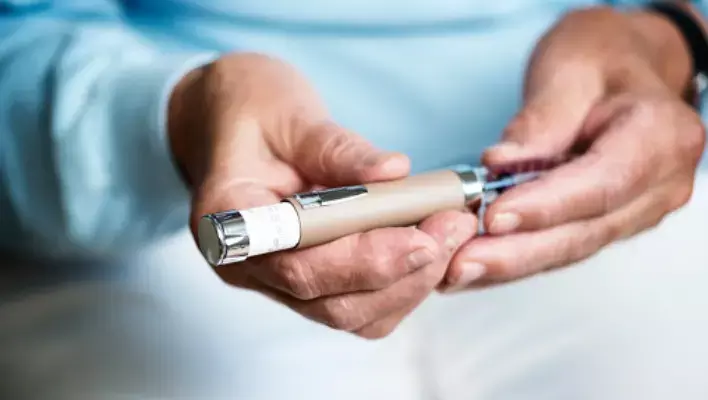- Home
- Medical news & Guidelines
- Anesthesiology
- Cardiology and CTVS
- Critical Care
- Dentistry
- Dermatology
- Diabetes and Endocrinology
- ENT
- Gastroenterology
- Medicine
- Nephrology
- Neurology
- Obstretics-Gynaecology
- Oncology
- Ophthalmology
- Orthopaedics
- Pediatrics-Neonatology
- Psychiatry
- Pulmonology
- Radiology
- Surgery
- Urology
- Laboratory Medicine
- Diet
- Nursing
- Paramedical
- Physiotherapy
- Health news
- Fact Check
- Bone Health Fact Check
- Brain Health Fact Check
- Cancer Related Fact Check
- Child Care Fact Check
- Dental and oral health fact check
- Diabetes and metabolic health fact check
- Diet and Nutrition Fact Check
- Eye and ENT Care Fact Check
- Fitness fact check
- Gut health fact check
- Heart health fact check
- Kidney health fact check
- Medical education fact check
- Men's health fact check
- Respiratory fact check
- Skin and hair care fact check
- Vaccine and Immunization fact check
- Women's health fact check
- AYUSH
- State News
- Andaman and Nicobar Islands
- Andhra Pradesh
- Arunachal Pradesh
- Assam
- Bihar
- Chandigarh
- Chattisgarh
- Dadra and Nagar Haveli
- Daman and Diu
- Delhi
- Goa
- Gujarat
- Haryana
- Himachal Pradesh
- Jammu & Kashmir
- Jharkhand
- Karnataka
- Kerala
- Ladakh
- Lakshadweep
- Madhya Pradesh
- Maharashtra
- Manipur
- Meghalaya
- Mizoram
- Nagaland
- Odisha
- Puducherry
- Punjab
- Rajasthan
- Sikkim
- Tamil Nadu
- Telangana
- Tripura
- Uttar Pradesh
- Uttrakhand
- West Bengal
- Medical Education
- Industry
Novel Once Weekly Basal Insulin as good as daily insulin for blood sugar control: Study

In a recent study, researchers have reported that a novel insulin formulation given once weekly was as safe and effective as a conventional daily insulin product for type 2 diabetes. The study findings will be presented at ENDO 2021, the Endocrine Society's annual meeting, compared an investigational drug called basal insulin Fc (BIF) with insulin degludec, a commercially available long-lasting daily insulin, in patients with type 2 diabetes.
Guidelines recommend that patients with type 2 diabetes undergo treatment escalation with the initiation of insulin when the treatment target is not achieved. But, there are often delays in the initiation of insulin treatment and its the fact that decreasing the insulin injections might facilitate the treatment acceptance, improve adherence and potentially improve blood sugar control. To further study the action of once-weekly basal insulin effects, Juan Frias, M.D and his team conducted a phase 2 study to demonstrate the safety and efficacy of the once-weekly injections of BIF compared with insulin degludec (control).
It was a 32-week, phase 2, randomized clinical trial conducted in 399 patients with type 2 diabetes and sponsored by Eli Lilly and Company. The researchers randomly assigned the patients to receive one of three treatment groups:
• once-weekly injections of BIF at one of two different dosing algorithms (with different goals for fasting blood sugar levels) or
• The standard once-daily injections of insulin degludec.
They determined that fasting blood sugar target for:
♦ Insulin BIF, one dosing patients receiving BIF as 140 milligrams per deciliter (mg/dL) and other at or below 120 mg/dL.
♦ Insulin degludec as 100 mg/dL or less.
Key findings of the study were:
- Compared with insulin degludec, the researchers found that patients taking BIF achieved similar long-term blood glucose control, as measured by haemoglobin A1c.
- At baseline, the average HbA1c was 8.1 per cent. At the end of the study, the researchers noted an improvement in A1c of 0.6 per cent for BIF and 0.7 per cent for insulin degludec.
- They also noted that the BIF use resulted in significantly lower rates of hypoglycemia.
Frias said in a press release that BIF has "the potential of a flatter and more predictable action than the current daily basal insulins, which may have contributed to the lower rates of hypoglycemia."
Frais concluded, "These study results demonstrate that BIF has promise as a once-weekly basal insulin and could be an advancement in insulin therapy," He further added, "Based on our promising data, further research with BIF has been initiated in patients with type 1 diabetes and other type 2 diabetes patient populations"
For further information visit:
Medical Dialogues Bureau consists of a team of passionate medical/scientific writers, led by doctors and healthcare researchers. Our team efforts to bring you updated and timely news about the important happenings of the medical and healthcare sector. Our editorial team can be reached at editorial@medicaldialogues.in.
Dr Kamal Kant Kohli-MBBS, DTCD- a chest specialist with more than 30 years of practice and a flair for writing clinical articles, Dr Kamal Kant Kohli joined Medical Dialogues as a Chief Editor of Medical News. Besides writing articles, as an editor, he proofreads and verifies all the medical content published on Medical Dialogues including those coming from journals, studies,medical conferences,guidelines etc. Email: drkohli@medicaldialogues.in. Contact no. 011-43720751


